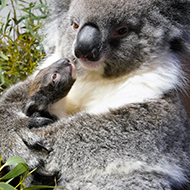
The joey is the first southern koala born in Europe.
The first ever southern koala to have been born in Europe is beginning to venture outside of its mother's pouch.
Born at Longleat, the joey has spent the first six months of its life inside mum Violet's pouch, and is reportedly doing well.
Keeper James Dennis explained: “It has been a long and complicated process, but this birth is really important for a number of reasons.
“As well as helping to raise awareness of the southern koala and the threats it faces in the wild, it is also teaching us so much about the species’ complex lifecycle.
“One of the most concerning issues with regard to southern koalas in Australia is the high levels of inbreeding and so the fact we are able to begin establishing a genetically diverse population here in Europe is also really important.”
The joey has a purpose-built koala enclosure to explore as it ventures out more at Longleat, which includes a natural stream, eucalyptus trees, climbing poles, indoor and outdoor habitats, viewing areas and a medical care unit.
A regular supply of eucalyptus leaves is also ensured for the koalas to eat, as a plantation of eucalyptus trees has been established on the estate.
Lord Bath, who is the patron of the Koala Life charity in South Australia, commented on the exciting milestone: “The arrival of the first baby southern koala is a huge event for the entire team here and something we have all been working towards and hoping for since we launched the new facility three years ago.
“We are delighted with how well both mother and baby are doing. As well as being a first for us, this is also Violet’s first experience of motherhood and she is proving to be a caring and attentive parent.
“We are still not fully sure on the sex of the joey but hope to get a better idea when it starts to spend more time outside of the pouch. Currently we want to leave them alone as much as possible.”
Image (C) Longleat



 The RCVS has announced a new version of its 1CPD mobile app, with enhanced features for veterinary surgeons and veterinary nurses to record their continuing professional development.
The RCVS has announced a new version of its 1CPD mobile app, with enhanced features for veterinary surgeons and veterinary nurses to record their continuing professional development.